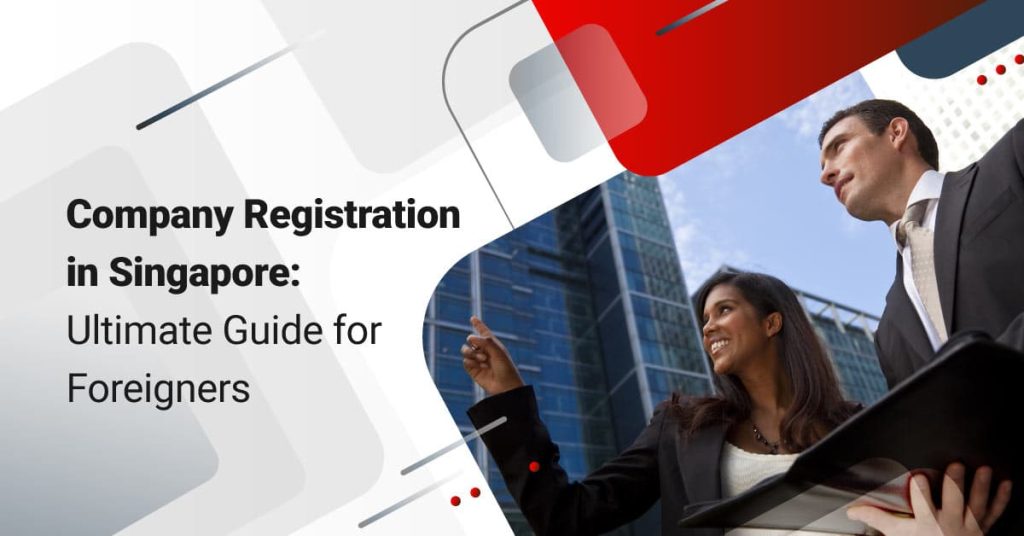 As the gateway to Asia, Singapore is situated in a prime location with world-class business-friendly infrastructure and policies. It makes for an excellent starting point for both foreign entrepreneurs and businesses seeking to penetrate the region.
As the gateway to Asia, Singapore is situated in a prime location with world-class business-friendly infrastructure and policies. It makes for an excellent starting point for both foreign entrepreneurs and businesses seeking to penetrate the region.
Hence, it is no surprise that many foreigners from around the world are interested in registering a company in Singapore. In this article, we help to break down the company registration process, and highlight the key aspects you need to know!
Why Should You Incorporate a Business in Singapore?
Singapore presents a compelling case for foreigners to start a business. It has a business-friendly environment, a highly supportive local government, and plenty of schemes that make it the prime choice.
Here are more reasons that make Singapore the ideal place to set up a business:
Ease of Doing Business
Singapore was recently ranked first in the world by the Economist Intelligence Unit (EIU) as the best business environment in the world, a position that it has proudly kept for the past 15 years.
Setting up and operating a company in Singapore is remarkably straightforward due to its business-friendly regulatory environment and streamlined procedures.
Singapore boasts an efficient incorporation process, and the government offers a plethora of helpful resources and support for businesses.
Attractive Tax System
Singapore’s tax environment is highly attractive, with corporate tax rates that are both competitive and with tax incentives and exemptions.
Since YA 2020, for the first 3 years of a company’s incorporation in Singapore, 75% of the first S$100,000 of profits earned are exempt from paying taxes.
Shareholders of Singapore companies also benefit from the absence of tax on dividends and capital gains.
Moreover, Singapore has formed an extensive network of double taxation avoidance agreements (DTAA) that significantly help reduce the tax burdens for businesses involved in international commerce.
Competitive Workforce and Talent Pool
Singapore has a highly skilled and multicultural workforce that thrives in a conducive environment for cross-cultural collaboration. As a hub for global talent, companies can take advantage of various programs and incentives to attract and retain top talent.
Related Read: Why is Singapore a Prime Spot for Top-Tier Foreign Talent?
Political Stability and Anti-Corruption Approach
Singapore boasts of a stable political environment, a robust legal system, and an unwavering commitment to the rule of law. These qualities make Singapore a secure hub for businesses, ensuring the protection of their investments and intellectual property rights.
100% Foreign Ownership
Foreigners incorporating a company in Singapore can enjoy complete ownership of its shareholding. They must register their business with the Accounting and Corporate Regulatory Authority (ACRA).
 3 Ways a Foreigner Can Register a Company in Singapore
3 Ways a Foreigner Can Register a Company in Singapore
There are 3 possible routes a foreigner can choose to start a Singapore company. They are:
Move to Singapore and Get an EntrePass
You can apply for an EntrePass that allows qualifying foreign entrepreneurs to start and run a business in Singapore.
The pass is open to all citizenships and nationalities. Potential applicants must fulfil these 2 conditions before they can apply:
- Have started, or plans to start, a private limited company that is registered with ACRA
- The company must either:
- Be venture-backed
- Have innovative technologies
- If the company is already registered, it must be less than 6 months old on the application date
- If the company is not yet registered, applicants can do so after knowing the result of their application
- Must meet any of the listed criteria as an entrepreneur, innovator, or investor on the Ministry of Manpower (MOM)’s website
Note that if you are successful in your application, you are advised to contribute to Singapore’s local startup scene through these activities:
- Offering mentorship for other startups
- Being a host or speaker at workshops or seminars
- Arranging for networking or deal-making meetings
Some businesses are not eligible for an EntrePass:
- Geomancy firms
- Employment firms
- Anything related to traditional Chinese medicine, such as acupuncture businesses
- Massage parlours and foot reflexology
- Businesses related to the night scene, such as bars, nightclubs, and karaoke lounges
- Certain F&B establishments such as hawkers, food courts, and coffee shops
Apart from complete ownership of the Singapore company’s shareholdings, an EntrePass holder can also be the company’s director or employee.
You must, however, enlist a registered filing agent to help you submit your application on your behalf.
Move to Singapore and Obtain an Employment Pass (EP)
After you incorporate a business in Singapore, you can relocate to the city-state by obtaining an EP. You can engage the services of a registered filing agent such as InCorp to submit your EP application on your behalf.
Note that you may only start a private limited company for this route. You must also hire a registered filing agent to help you file your company setup application.
Remain Overseas and Engage a Locally Resident Representative
Foreigners residing overseas can incorporate a company in Singapore with the help of a locally resident nominee director or authorised representative to run the business.
This local resident can be a:
- Singapore Citizen
- Singapore Permanent Resident (PR)
- EntrePass or Employment Pass (EP) holder
You will also need to engage a registered filing agent such as InCorp to submit your application to ACRA’s BizFile+ portal.
InCorp also provides other company incorporation services, such as a registered business address, company secretary, and nominee director assistance.
What Are the Requirements to Register a Business in Singapore for Foreigners?
A foreigner can start a business in Singapore easily. These are the basic requirements:
- At least 1 Singapore-based director
- At least 1 shareholder
- At least S$1 paid-up capital, in any currency
- A registered business address in Singapore
- A local company secretary
What Are the Business Entities in Singapore?
Depending on the means that they choose to set up a company in Singapore, foreigners have several business entities that they can choose from. We explore them below:
Private Limited Company (Pte Ltd)
A private limited company is the most popular option for both locals and foreigners setting up a company in Singapore.
Apart from being highly flexible and scaleable, this business entity type also benefits from the best tax regimes. A private limited company has these key features:
- Has share capital
- Has 50 shareholders at most
- Businesses can be individuals, shareholders, or a mix of both
Partnership (Ordinary, Limited, and Limited Liability)
A partnership, whether ordinary, limited, or limited liability, involves at least 2 or more individuals. However, for ordinary partnerships, it must incorporate as a local company instead if it exceeds 20 partners; for the rest, there is no limit.
Of these, the limited liability partnership tends to be the preferred option for incorporating companies. This is because it maintains a separate legal entity from its partners, and the partners also have limited liability.
In the case of company debt and losses, the partners are only personally liable for those arising from their own wrongful actions, and not of other partners.
Sole Proprietorship
A sole proprietorship is the least preferred company entity compared to the other options. Despite being relatively more straightforward, it is also riskier because the business owner assumes personal responsibility for the business’ debts and losses, which is also unlimited.
This means that the owner’s personal assets are not protected from the business’ liabilities. If the business incurs debt, the creditors can demand payment from the individual or company’s assets.
It is also considered the same entity as the owner – whether the owner is an individual or a legal entity.
What is the Process of Company Registration in Singapore?
The company registration process in Singapore involves these primary steps:
- Determine how you wish to incorporate your company in Singapore – whether you want to run it from Singapore or from overseas
- Choose your ideal business structure from the available options
- Reserve your company name
- Register your company with ACRA
Note that while company name applications are usually approved or rejected within a day, any additional referrals require a longer time of 14 to 60 days.
After a name application has been approved, it will be reserved for 120 days. You must ensure that your company is registered within this timeframe.
When you submit your company registration application, you must ensure that all the documents are in place. Most applications are approved within a day.
However, similar to the name application, additional referrals or approvals will also take 14 to 60 days.
What Are the Documents Needed for Company Registration in Singapore?
Remember that you must engage a registered filing agent to submit your company application to ACRA. Here are the documents you must furnish your application with:
- Company name
- Company’s SSIC code and brief description of primary activities
- Details of company shareholders and directors
- Share capital information
- Registered business address in Singapore
- Company constitution
What Happens After Incorporation?
The tasks do not end after your company incorporation. There are also other things to do, such as opening a corporate bank account and registering for Goods and Services Tax (GST).
Receiving Your Certificate of Incorporation and Free Business Profile
After you register your company successfully, ACRA will send you an email notification that acts as your certificate of incorporation. It will also have your company registration number, the Unique Entity Number (UEN).
You will also receive a free business profile, which is an electronic report that has your company details. This profile can be used by potential stakeholders for background checks.
Engaging a Company Secretary and Auditor
Companies in Singapore must employ a company secretary within 6 months after incorporation and a company auditor within 3 months of incorporation.
They may not need to appoint an auditor if they are exempt.
Opening a Business Bank Account
Companies in Singapore are highly encouraged to open a corporate bank account. There are a few options you can choose from:
- Opening with a traditional bank (DBS, OCBC, UOB)
- Opening with a digital bank (ANEXT, Green Link Digital Bank)
- Opening with a neobank (Aspire, Wise, Revolut)
Related Read: Banking on the Future: Why Are Neobanks in Singapore on the Rise? »
Applying for a Business Licence
You may need to apply for a business licence depending on the business activities you plan to engage in. You must perform this activity after you incorporate your company in Singapore and before you start operating it.
GST Registration
If you reasonably expect your company’s yearly turnover to be more than S$1 million, you must register for GST. Otherwise, you are not required to do so.
Corppass Registration
You can register for Corppass, a corporate digital identity for businesses in Singapore, to transact with government agencies online.
Visit the Corppass website to establish and manage it. You can also give access to your company’s employees so that they can transact on the company’s behalf with their Singpass accounts.
Annual Filing Requirements
The Singapore Companies Act has annual filing requirements that companies must follow. Here is the list of the important deadlines to note:
- File IR8A for employees on 1 March every year
- File ECI on 31 March every year
- Hold Annual General Meeting (AGM) within 6 months after the financial year end (FYE) for non-listed companies (private companies may not need to do so under Section 175A of the Act)
- File Annual Returns (AR) within 7 months of the FYE
- File corporate tax on 30 November online every year
- File GST returns for applicable companies based on the timeline here
Other Corporate Services You Will Need
A business needs various corporate services as it operates, such as in accounting, human resource (HR), taxation, and more. InCorp is fully equipped to help you navigate these confusing aspects of your business in Singapore.
Immigration
If you plan to hire foreign employees, there are certain work passes that they need to obtain before they can enter Singapore and start working for your business.
For example, most professionals and executives require an EP work visa. There are eligibility requirements that they must meet before the work pass can be issued to them, such as having a monthly salary of at least S$5,000.
Related Read: An Overview of the ONE, EP, and PEP Work Passes »
Secretarial and Compliance
Every company in Singapore must abide by statutory compliance requirements. A company secretary can help to manage and ensure that your business fulfils its corporate regulatory requirements.
Taxation
Singapore has attractive tax schemes for individuals and companies. It is important to know the taxation schemes that apply to ensure compliance and to benefit the most from incentives.
InCorp has a committed and experienced tax team that guides and manages personal income and corporate income needs.
HR
There are guidelines that companies must adhere to when hiring local employees in Singapore. Tapping on the expertise of a knowledgeable firm like InCorp can ensure that your business complies with these guidelines.
Our dedicated HR professionals can also help to provide advice when it comes to hiring your staff.
Risk Assurance
Amidst an ever-changing business landscape, having proper risk assurance measures in place can help your Singapore business mitigate risks, protect its assets, and attain your strategic objectives.
InCorp can provide your business with risk assurance guidance in these areas:
- Internal Audit
- Sustainability Reporting
- Risk Management
Incorporate Your Company in Singapore With InCorp
We understand that it can be a daunting task for foreigners looking to register a company in Singapore. At InCorp, our team of corporate service professionals are here to guide you through every step of the way.
Backed by our decades of expertise and knowledge, we are confident that we can provide you with the dedicated guidance and support you need to navigate this unfamiliar landscape.
Contact our team
Posts not found!
FAQs
Can a foreigner be a director of a company in Singapore?
- Yes, it is possible if you are a foreigner residing overseas as long as you engage a local nominee director. If you are on an existing work pass in Singapore, you must be an EntrePass holder to assume directorship.
How much does it cost to register a company in Singapore?
- The fees depend on the type of business you want to register in Singapore. Our incorporation experts are here to explain the various costs to you.
Can Dependant’s Pass (DP) holders register a company?
- Yes, they can, but they must first obtain a Letter of Consent (LOC) from MOM to manage the business after registering the business


